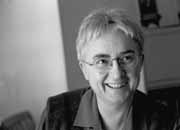

Maria Pacelli: Prized performer
You can almost hear her squirming at the other end of the phone -- Maria Pacelli is clearly uncomfortable about being interviewed. It's not that she's shy around the media -- far from it.
The Department of Anes-thesia's administrative secretary can be downright bold in approaching writers. But her goal is always to shine the spotlight on the faculty members in her department. Wouldn't I rather write about one of her professors instead?
The self-effacing Pacelli is the first winner of the new Anne McCormick Award for Excellence in the Faculty of Medicine, created to recognize contributions by outstanding non-academic staff. Pacelli says the connection to the recently retired McCormick, who was assistant to the dean for over 20 years, makes the award all the sweeter.
"I was forever calling her up, asking her for advice. She is a tremendous woman, afraid of no one. She is somebody who can take on the world."
Dr. Franco Carli, chair of the Department of Anesthesia, says that when word spread to his staff about the new award, several professors shared the same immediate reaction -- "We've got to nominate Maria."
"When people talk about Maria, it's with genuine affection," says Carli. "Maria is always filled with ideas, always filled with energy. When a problem emerges, she always seems to know who to call -- whether it's someone in the dean's office or in the Department of Immigration."
As administrative secretary, Pacelli tackles the sort of work one would expect -- she looks after the accounts, tends to the paperwork connected to staffing issues, makes sure that departmental committees have administrative support and handles the bulk of the department's correspondence.
She also does things you might not expect. And she does them exceedingly well. Carli likens Pacelli's presence to having an in-house fundraiser and publicist.
Pacelli edits the department's newsletter and set up its website. She led a $900,000 fundraising campaign that resulted in the creation of the Harold Griffith Endowed Chair in Anesthesia. She spearheaded an effort that saw Griffith -- the McGill professor who discovered the anesthetic properties of the drug curare -- commemorated on a Canada Post stamp.
Pacelli has a keen interest in the history of her department. She successfully applied for a traveling scholarship to Chicago's Wood Library Museum of Anesthesiology in order to examine the museum's holdings on Wesley Bourne, founder of McGill's Department of Anes-thesia. She then co-wrote a published biography of Bourne. She established the department's historical library, organizes conferences and helps visiting professors and clinical fellows cope with the challenges of an unfamiliar city.
Pacelli says she's been lucky in working with a series of departmental chairs who've supported her in taking on projects out of the norm. "When I come up with a crazy idea, nobody ever stops me."
Her loyalty to McGill stems from the University's kindness towards her father years ago. When his health took a turn for the worse, Pacelli recalls her dad being visited in the hospital by a representative from the company where he worked. "He basically said, 'Get out of bed and go to work right now or there's no job for you.'" Pacelli helped her dad find a position as a porter in the McIntyre Medical Sciences Building. "My father was a proud, hard-working man and I've been grateful to McGill ever since."
Which isn't to say that Pacelli thinks McGill is perfect. She believes the University could do a much better job fostering promotion opportunities for non-academic staff who, even when they excel in their jobs, often have no way of moving up the ladder.
There's no mistaking her devotion to her department. "Anesthetists are often rather unfairly viewed as technicians and this is sometimes seen as just a service department. Our people are doctors and they're doing world-class research. I don't think they get the recognition they deserve."
With Maria on the case, that's likely to change.
Daniel McCabe
| 


